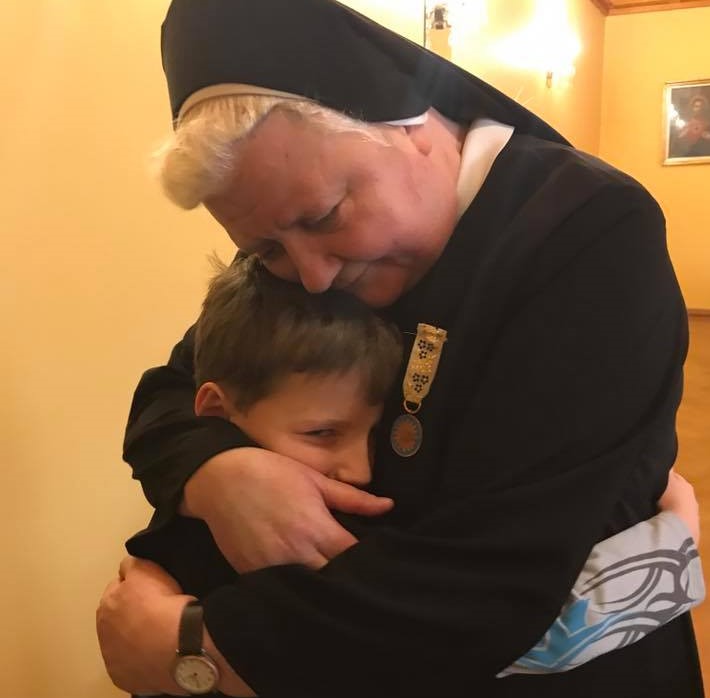Sister Lucy.
I knew she was going; these were the last days of her life. I tried to keep up with her, understand and grasp the essence of dying, going to this prayed and awaited eternal life. The last words of Sister Lucy, whispered over the receiver of her perpetually crashing phone: Henius, dear, thank you for everything, for each of your moment days with me. Forgive me if I offended you even unknowingly, even mentally.
That was Lucy. She never thought about herself. These almost ten years of friendship and working together have been continuous learning for me. Difficult questions and even more difficult answers. My rebellion against social injustice and human meanness collided with Lucy “turn the other cheek.” My anger at the people who dealt more blows with me and the desire to retaliate met her patient “pray for them, ask for the grace to distinguish between good and evil, so that they will stop doing evil. With time, I became a different person with more patients. Before making a criticism, I was asking myself some questions. It’s hurt. When I ask the more questions and I had few answers, it became more hurt. It has been almost nine years since Lucy came to me ashamed, and asked for help. She, Saint Lucy (that’s what people talked about her) stood in front of me in a washed-out habit, mossed on her stomach, in trampled flip-flops, and in her hands a torn old purse – her entire circuit office, with stamps, a notebook, an old cell phone, and tried to explain to me where her poverty and need come from. I looked at this strange figure angrily. I listened to the incoherent story, I arrogant and saucy, furious with everything, having ready solutions and unambiguous answers to every question.
I will not give my sister any money, because I do not have it myself, but I will work until we fix the system, I declared. Back then I didn’t know that to fix the system I would have to fix myself. It was hard. God could not help but notice so many shed tears together with Lucy. His hydrological services must have noted significant high levels, because she probably got pissed off and forgave us these torments with the government. Lucy taught me humility and I taught her courage. Sometimes, during conversations in the government tables, when the atmosphere was reached a boiling point, I surreptitiously kicked Lucy in the ankle to go for prayer. She was standing behind the half-closed door, sniffing at the rosary, counting on God’s help that maybe some miracle would happen. Over time, we became a very strange couple: she was big, stooped, walking with a heavy pace, and I was small, in boots and walking, both grey-haired, walking together like a pair of old horses in harness. Our friends commented on our media that it is scary to open the refrigerator because of fear that may be Lucy will be there. Lucy was afraid of the microphone and the camera. She did not like recordings; she was embarrassed to talk about her work and problems. There was no way out, finally she agreed to these cameras and microphones, because it was necessary to show the social problem, expose the lack of state care for abandoned children with intellectual disabilities, and finally repair this leaky system. She loved journalists, and had a very deep personal and family friendship. There was a place to sleep and a bowl of soup for each of them. They repaid with respect for her privacy and journalistic integrity. Sister Lucy knew everyone. Literally everyone and everywhere. She had a badly worn notebook with telephone numbers. She opened it when she needed it. Not necessarily yours. “Mercy is to be silent,” she would say, shoving a banknote into my hand and showing my grandmother rummaging in a garbage can. Do not say it’s from me; give it discreetly so that no one can see. Or: Henia, look at this poor man who is walking down the street. He was once somebody, he had money in his position, and he was a doctor. Remember about him, he doesn’t drink anymore but sometimes he needs a few (money) zlotys. I worked for a bowl of soup, because working without a reward is a sin – she used to say. I regularly got a hot dinner, a clean napkin and necessarily two lunch portions. Sister, I won’t eat it, I don’t need that much, I protested. Share, see how many poor people are walking on the street – she always had an answer ready. We both knew that the disease was progressing, impotence and unimaginable pain became its inseparable companion, which only leads to one way. Until the end, she handed over a kind of will to me, indicated people, entrusted them to my care, and asked for their memory. Until the end, she also quoted a funny saying: a nun must be a human, otherwise a habit can be hung on a peg, but the peg, because of wearing a habit, will not become a nun.
Henryka Szczepanowska

